Finding the best crypto wallet is an important part of keeping your digital assets secure. There are many different types of wallets, like hardware wallets, software wallets, hot and cold wallets. But with all the options out there, it will feel a bit overwhelming, which is why we’re here to help to find the best one.
Here, we’ll look into the best crypto wallets of 2025 so you can choose the one that best suits your needs. Let’s get into it.
10 Best Crypto Wallet You Should Try in 2025
Here’s a brief overview of the best crypto wallets that you should definitely check out.
| Wallet Name | Unique Feature | |
| MetaMask | Integration with DeFi and hardware wallets | Explore MetaMask Now |
| Coinbase Wallet | Self-custody with dApp browser and Solana support | Download Coinbase Wallet Today |
| Trust Wallet | Multi-chain support with staking and NFTs | Try Trust Wallet for Free |
| Ledger Nano X | Bluetooth-enabled hardware wallet | Ger Ledger Nano X Now |
| Exodus | Built-in exchange and staking options | Start Using Exodus Today |
| Trezor | Open-source firmware and password manager | Secure your Crypto with Trezor |
| Zengo | Keyless encryption with biometric security | Download Zengo for Free |
| OKX Wallet | Multi-chain compatibility with NFT trading | Discover OKX Wallet Features |
| Binance Wallet | Low fees on Binance Smart Chain | Use Binance Wallet |
| Arculus Key Card | Compact NFC card with three-factor authentication | Buy Arculus Key Card Today |
Now, let’s discuss each of the best wallet for crypto in complete detail.
OKX Wallet – Best crypto wallet app
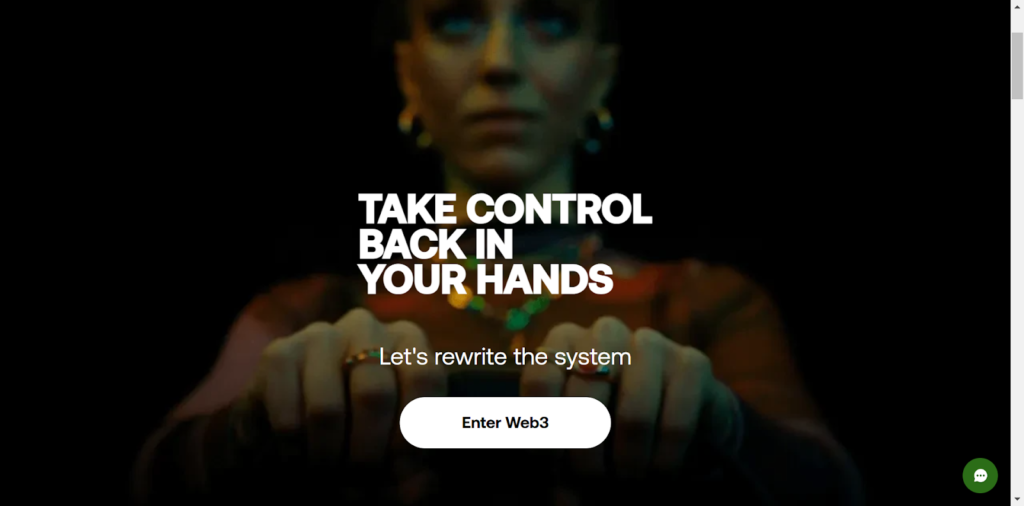
OKX Wallet is a non-custodial best wallet for crypto offered by the OKX exchange. It provides users with full control of their crypto assets. Additionally, OKX Wallet supports multiple blockchains and a variety of cryptocurrencies which makes it a versatile choice for both beginners and advanced users. The wallet is free to use with standard blockchain transactions fees applying.
What makes OKX Wallet unique is its integration with DeFi and NFT platforms. Users can easily explore dApps, trade NFTs and participate in staking or yield farming and that too all within the same wallet. Its multi-chain compatibility enhances accessibility to various blockchain ecosystems.
OKX Wallet prioritizes security by offering seed phrases, encrypted private keys and 2FA. Since it is non-custodial, users can easily maintain full ownership of their private keys which ensures no third-party access to their funds. This crypto wallet has recently announced enhanced support for zkSync and other Layer 2 blockchains which offer faster transactions and lower fees for active users.
Features
- Multi-Chain Support: Compatible with multiple blockchains for enhanced versatility.
- DeFi Integration: Access staking, yield farming, and dApps directly.
- NFT Support: Trade and store NFTs within the wallet.
- Non-Custodial: Users have full control over their private keys.
Pros
- Excellent for accessing DeFi platforms and NFTs.
- Multi-chain support for a wide range of assets.
- Easy-to-use interface for all levels of users.
- Free to download with no hidden fees.
Cons
- Limited advanced security features like hardware wallet integration.
- Requires users to manage their private keys carefully.
Who It’s Ideal For
OKX Wallet is ideal for users involved in DeFi and NFT trading. Its multi-chain compatibility makes it perfect for those exploring various blockchain ecosystems. With the growing popularity of zkSync and Layer 2 solutions, OKX Wallet appeals to users seeking faster and cheaper transactions.
Binance Wallet – Best crypto wallet online
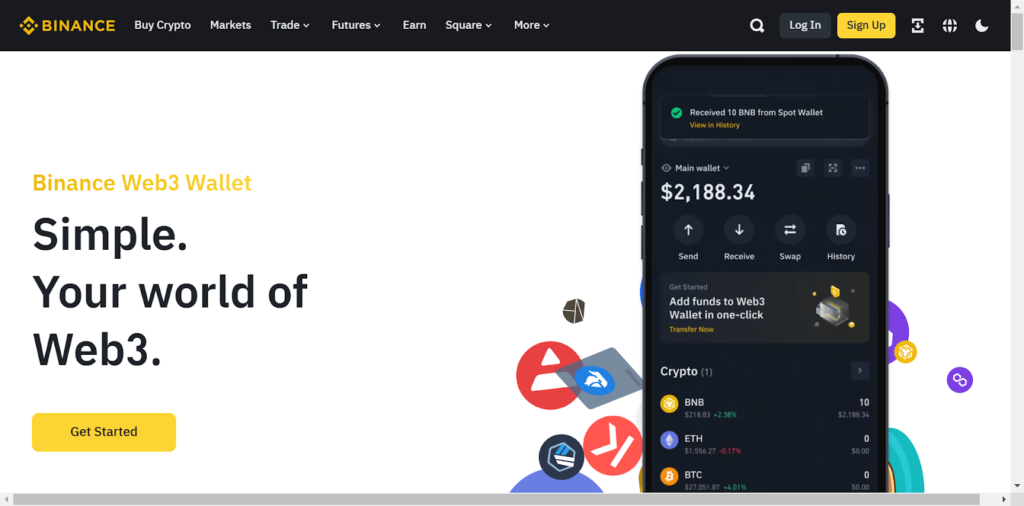
Binance Wallet is a non-custodial wallet created by Binance, one of the largest crypto exchanges in the world. It supports a wide variety of cryptocurrencies including Binance Coin, Bitcoin, Ethereum, and more. Similar to all other online software wallets, this one is free to use as well.
The main reason why most people use this wallet is its integration with the Binance exchange, making it the best crypto wallet. As millions of people use this exchange, they’re bound to use the wallet as well which has increased its user base a lot. Through it the users can transfer funds easily to their trading accounts. Moreover, Binance Wallet supports Binance Smart Chain (BSC) for fast and cost-effective transactions.
For security, Binance stores the private keys locally. It also allows users to connect to a hardware wallet to keep their funds more secure because of their multi-signature protection through third-party apps. Just recently, Binance Web3 wallet and Solv Protocol launched a $300,000 SolvBTC rewards campaign in which you can participate as well.
Features
- Exchange Integration: Easily transfer funds between the wallet and Binance exchange.
- Binance Smart Chain Support: Fast and low-cost transactions on BSC.
- dApp Access: Explore DeFi and NFT platforms.
- Multi-Asset Support: Works with Bitcoin, Ethereum, BNB, and more.
Pros
- Excellent integration with Binance exchange.
- Low fees for transactions on Binance Smart Chain.
- Supports a wide range of cryptocurrencies.
- Simple to use for beginners.
Cons
- Limited functionality compared to standalone wallets.
- Heavy reliance on Binance ecosystem.
Who It’s Ideal For
Binance Wallet is perfect for users who trade on Binance and want a seamless way to manage their funds. It’s also ideal for those seeking low-cost transactions on Binance Smart Chain. This wallet appeals to a large audience which is evidenced by the 120 million users who are already using this crypto exchange wallet.
MetaMask – Best crypto wallet uk
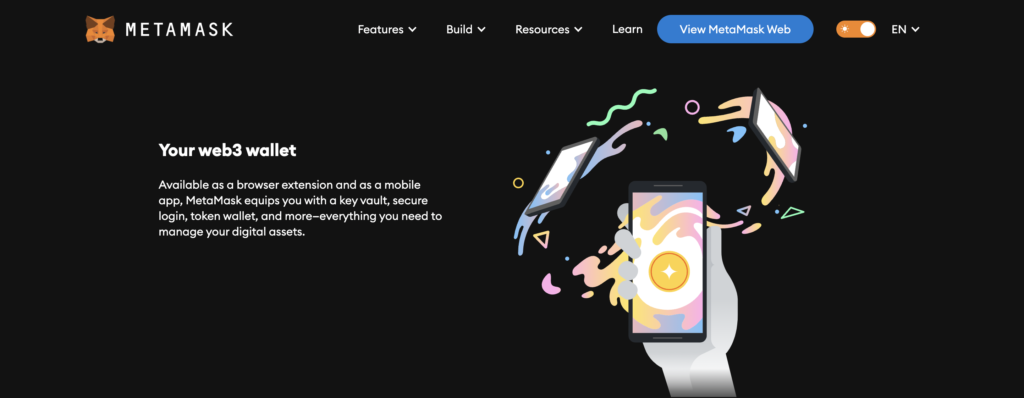
MetaMask is a popular crypto wallet which is mostly used for storing Ethereum and Ethereum-based tokens. It was launched in 2016 and is available as a browser extension and a cryptocurrency wallet app. With over 30 million monthly active users, it has now become a go-to platform for traders who engage with decentralized applications (dApps) and DeFi platforms. MetaMask is totally free to use but you’ll have to pay gas fees whenever you complete a transaction.
The thing that makes this crypto wallet stand out is its integration with various DeFi platforms which allows users to swap tokens directly within the wallet. It also offers customizable gas fees and supports hardware wallet connections like Ledger and Trezor, which are hardware wallets, for more secure transactions. MetaMask is currently one of the best Bitcoin wallets due to its popularity and ease of use.
MetaMask uses strong security measures to keep the funds safe such as password protection, seed phrases for recovery and encryption of private keys stored on the user’s device. As for what’s happening recently in the wallet is that they have upgraded their Swaps feature. It has reduced the fees and increased the number of tokens. The platform is also planning a subscription service that will offer advanced analytics and tools for users.
Features
- Multi-Blockchain Support: Works easily with Ethereum and EVM-compatible blockchains. These include Binance Smart Chain and Polygon.
- Built-In Token Swaps: Swap tokens directly within the wallet using its integrated swapping feature.
- Hardware Wallet Integration: Connects with devices like Ledger and Trezor. It increases security.
- Access to dApps: Easily connect to decentralized apps and DeFi platforms. Can be used for a variety of use cases..
Pros
- Free and highly accessible for Ethereum users.
- Integrates easily with DeFi platforms and dApps.
- Offers detailed control over gas fees.
- Compatible with multiple hardware wallets.
Cons
- Limited to Ethereum and EVM-compatible blockchains.
- Vulnerable to phishing attacks if not used cautiously.
Who It’s Ideal For
MetaMask is ideal for users who are active in the Ethereum ecosystem and DeFi platforms like NFT marketplaces. It’s perfect for those looking for a convenient way to interact with dApps. Additionally, because of its simple interface, it’s great for beginners exploring Ethereum-based tokens.
Coinbase Wallet – Best crypto wallet for beginners
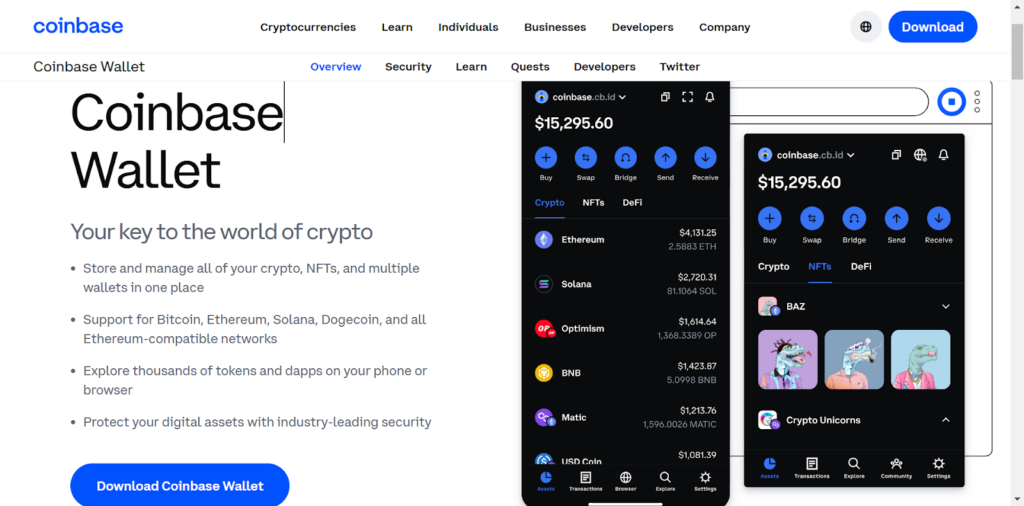
Coinbase Wallet is a self-custody wallet offered by the Coinbase platform. It supports a wide range of cryptocurrencies which include Bitcoin, Ethereum and tons of altcoins. Now, don’t get confused between Coinbase Wallet and the Coinbase Exchange Wallet. Both of them are different as the Coinbase Wallet offers complete control of your private keys while the exchange one is still under another authority. The wallet is free to download for anyone but blockchain network fees apply whenever you make a transaction.
What sets Coinbase Wallet apart is its ability to link directly with the Coinbase exchange for easy transfers. It also features dApp browser which allows users to explore decentralized finance projects and NFT marketplaces with ease. Security is also a priority for Coinbase Wallet. It uses biometric authentication, 2FA (Two-Factor Authentication) and private key encryption.
As a user you’re also given a recovery phrase for backup and access when you sign up for the wallet. Just recently, Coinbase Wallet added support for Solana-based tokens and NFTs to expand its capabilities for users involved in diverse ecosystems.
Features
- Self-Custody: Users have full control over private keys.
- dApp Browser: Easily access NFTs, DeFi platforms, and Web3 apps.
- Wide Asset Support: Works with Bitcoin, Ethereum, Solana, and more.
- Exchange Integration: Connect directly with Coinbase for easy transfers.
Pros
- Provides strong security features like biometrics and 2FA.
- Supports a wide range of cryptocurrencies and NFTs.
- User-friendly and simple for beginners.
- Built-in dApp browser for easy Web3 access.
Cons
- Heavily reliant on Coinbase for added functionality.
- Limited advanced features for professional traders.
Who It’s Ideal For
Coinbase Wallet is perfect for beginners and NFT enthusiasts due to its user-friendly design and support for Solana and Ethereum NFTs. It’s also a great choice for users who already use Coinbase as the integration simplifies transfers and portfolio management. With over 108 million Coinbase users worldwide, the wallet serves as a reliable gateway for crypto newcomers.
Trust Wallet – Best crypto wallet in india
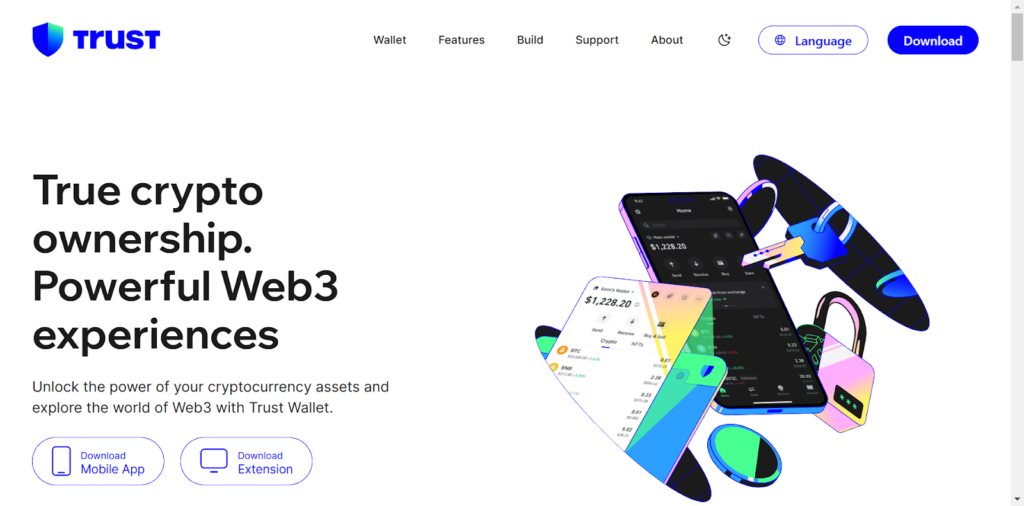
Trust Wallet is a popular mobile crypto wallet known for its multi-chain support and ease of use. It is the official wallet of Binance but operates as a standalone application. Supporting over 4.5 million assets and 65 blockchain, it’s a great option for those looking for versatility. This best crypto wallet is free for anyone to download and use, though standard blockchain fees always apply.
Additionally, Trust Wallet has an integrated browser and stacking capabilities. Users can explore dApps and earn rewards by staking supported cryptocurrencies directly from the wallet. Apart from that its non-custodial nature ensures that users have complete control over their private keys.
For security, Trust Wallet uses a 12-word recovery phrase and private key encryption. It does not require users to provide personal information so that the users remain anonymous. While there are no advanced features like multi-signature supports, it’s the simplicity that attracts most beginners. As of 2024, it is expanding its staking options so that users can earn higher rewards. It is also enhancing its NFT support for ETH-based tokens.
Features
- Multi-Chain Support: Works with over 60 blockchains and supports 4.5 million assets.
- dApp Browser: Access decentralized apps directly within the wallet.
- Staking Capabilities: Stake supported tokens to earn rewards.
- Private Key Control: Users have full ownership of their keys.
Pros
- Supports a wide variety of cryptocurrencies and blockchains.
- Simple interface ideal for beginners.
- Integrated dApp browser for exploring DeFi and NFTs.
- Free to use with no additional fees beyond blockchain charges.
Cons
- Limited advanced security features like multi-signature support.
- Only available as a mobile app, with no desktop version.
Who It’s Ideal For
Trust Wallet is ideal for users looking for a versatile wallet with multi-chain support and staking features. It’s especially perfect for beginners who want to explore DeFi and NFTs all thanks to its user-friendly design. With over 13 million active users, Trust Wallet is a trusted option for crypto-enthusiasts worldwide.
Ledger Nano X – Best crypto wallet hardware
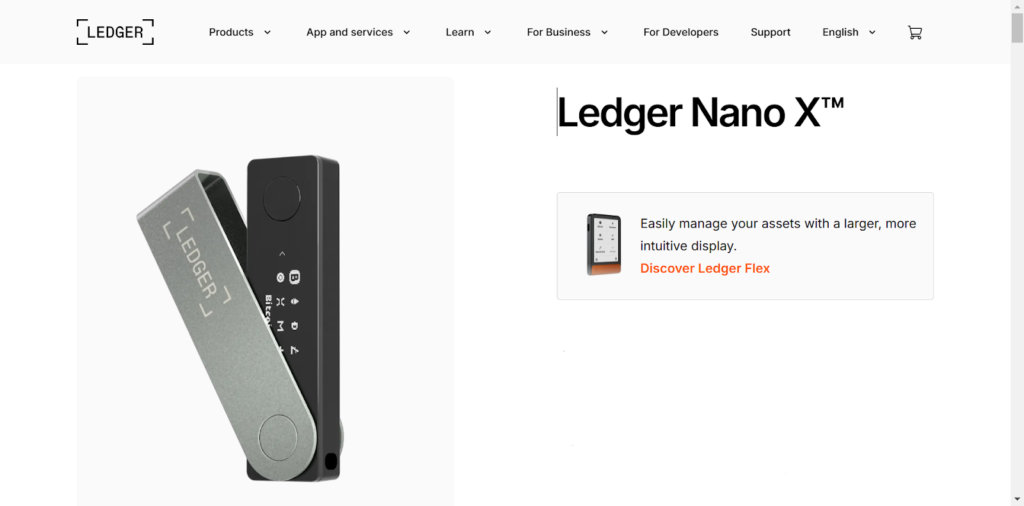
The next best crypto wallet in this list is the Ledger Nano X. It is a cold wallet for cryptocurrency designed for maximum security. It supports over 5,500 cryptocurrencies and connects to both mobile and desktop devices via Bluetooth or USB. Priced at $149, it’s a premium choice for users who want to store their cryptocurrencies offline.
The standout feature of this crypto wallet is its Bluetooth functionality which makes it more portable than older models. The Ledger Live app further enhances usability and allows users to manage their assets, stake crypto and access DeFi platforms.
Moreover, Ledger Nano X provides top-tier security with a secure element chip (CC EAL5+ certified). It ensures private keys never leave the device to protect the users from hacking attempts. To keep the wallet safe, the platform regularly updates the firmware and keeps it up to date. In 2024, Ledger introduced enhanced DeFi integrations within the Ledger live app which makes it easier for users to interact with decentralized platforms.
Features
- Bluetooth Connectivity: Enables wireless use with mobile devices.
- Ledger Live App: Manage assets and stake crypto with ease.
- Multi-Currency Support: Works with over 5,500 cryptocurrencies.
- Secure Element Chip: Provides enterprise-grade security for private keys.
Pros
- Exceptional security for offline storage.
- Compact and portable with Bluetooth functionality.
- Easy asset management via Ledger Live.
- Regular firmware updates ensure the latest protection.
Cons
- Expensive compared to other wallets ($149).
- Bluetooth functionality may raise security concerns for some users.
Who It’s Ideal For
Ledger Nano X is ideal for users with large crypto portfolios or those prioritizing security. It’s especially suited for long-term holders looking for secure offline storage. Till now 6 million Ledger wallets have been sold which means it’s trusted for advanced crypto management.
Exodus – Best crypto wallet android
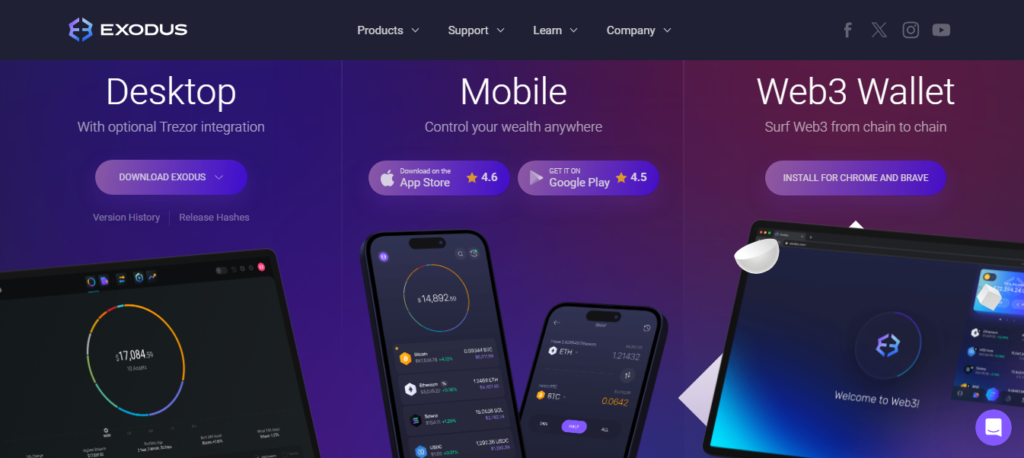
Exodus is a multi-currency software wallet which is known for its intuitive design and beginner-friendly interface. It is available for desktop, mobile and hardware integrations with Trezor and supports over 200 cryptocurrencies. Moreover, this crypto wallet is free to use, though you need to pay a fee for every transaction. The wallet also offers a built-in exchange feature for swapping assets easily.
The Exodus cryptocurrency wallet app allows users to manage their holdings and track performance directly from it. The wallet also offers staking options for specific cryptocurrencies which allows users to earn rewards like a breeze. For security, Exodus uses local storage of private keys, password protection and a 12-word recovery phrase for backup. It doesn’t require any personal information while maintaining user privacy.
However, it lacks features like 2FA that advanced users expect from such crypto wallets. In 2024, Exodus introduced support for Solana-based tokens and improved staking rewards for popular assets like ADA and SOL.
Features
- Multi-Platform Support: Works on desktop, mobile, and integrates with Trezor wallets.
- Built-In Exchange: Swap cryptocurrencies directly in the wallet.
- Portfolio Tracking: Visually track the performance of your holdings.
- Staking Options: Earn rewards on supported cryptocurrencies.
Pros
- Beautiful, user-friendly interface.
- Integration with Trezor for added security.
- Built-in exchange for easy asset swapping.
- Supports over 200 cryptocurrencies.
Cons
- Lacks advanced security features like 2FA.
- Customization options for fees are limited.
Who It’s Ideal For
Exodus is perfect for beginners and casual users who value a visually appealing, easy-to-use wallet. It’s also ideal for those who want staking options and basic hardware integration. With its growing features and intuitive design, this crypto wallet appeals to over 1 million active users all over the world.
Trezor – Best crypto wallet offline
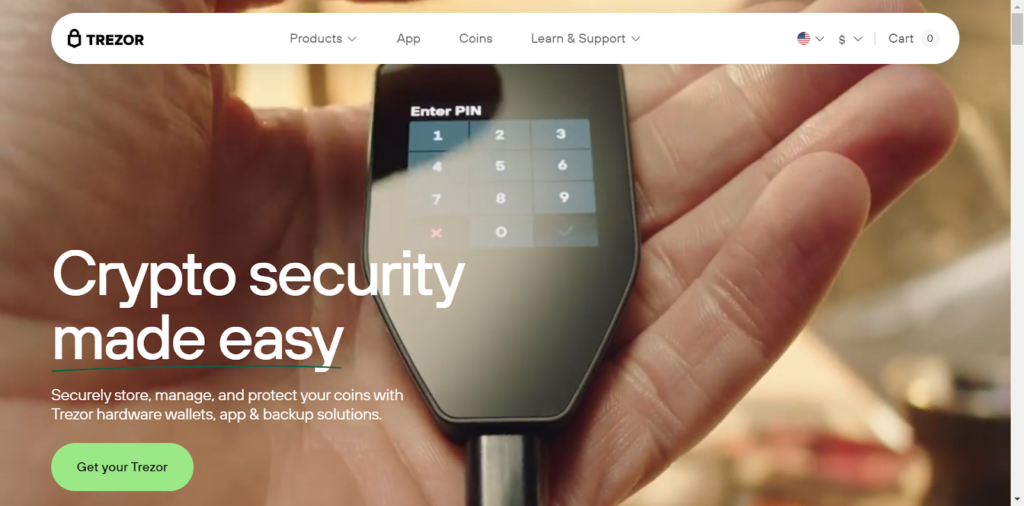
Trezo is a cryptocurrency cold wallet and is one of the most trusted names in hardware wallets which are designed for high-level security. It supports over 9,000 cryptocurrencies and offers two different versions, one is budget-friendly while the other is a bit expensive. Trezor One starts at $69 while the Trezor Model T costs around $220 and has advanced features like a touchscreen.
The thing that makes Trezor stand out is its open-source firmware. It ensures transparency and security. The wallet also includes a password manager and support for third-party wallets like MetaMask. The Model T adds extra functionality with its full-color touchscreen interface. For security, Trezor uses a secure PIN system which is a 12-24 word recovery phrase and offline storage for private keys.
The firmware on this wallet is regularly updated to address emerging threats and the wallet’s open-source nature means it’s constantly reviewed by the community. Recently, Trezor rolled out an update for its Model T to enhance compatibility with DeFi platforms and improve user experience.
Features
- Two Models: Trezor One for basics and Model T with advanced features.
- Open-Source Firmware: Transparent and community-reviewed security.
- Third-Party Integration: Works with wallets like MetaMask.
- Password Manager: Securely store and manage your passwords.
Pros
- Industry-leading security features.
- Supports over 9,000 cryptocurrencies.
- Transparent and regularly updated firmware.
- Compatible with multiple third-party apps.
Cons
- Higher price point for the Model T.
- Lacks Bluetooth connectivity for mobile convenience.
Who It’s Ideal For
Trezor is ideal for long-term holders and users prioritizing security. Its transparent firmware and powerful safety measures make it a top choice for advanced users. With over 1 million units sold Trezor is a trusted name in crypto security.
Zengo – Best crypto wallet software
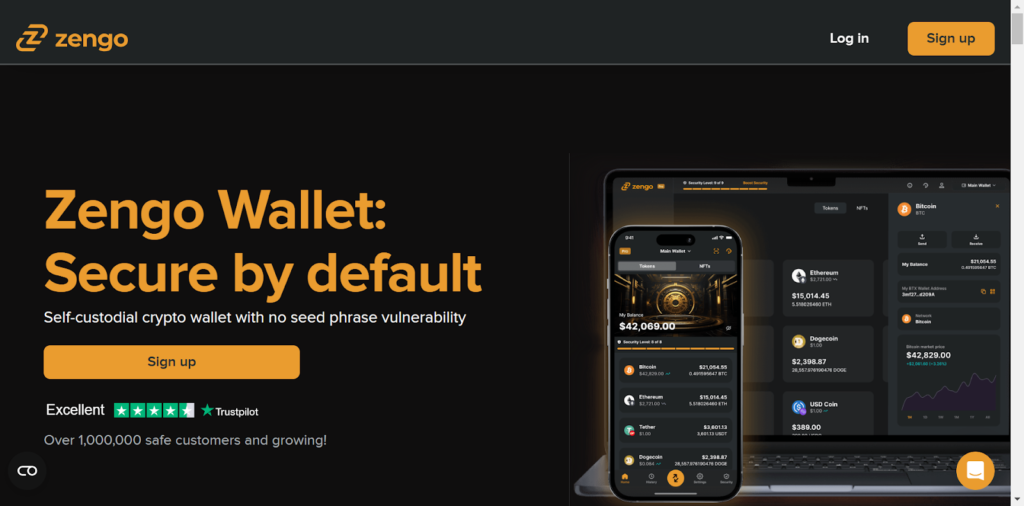
Zengo is a cryptocurrency wallet app that eliminates private keys by using facial biometrics and keyless encryption instead. It supports over 70 cryptocurrencies and provides an easy-to-use platform for beginners and experienced users alike. The wallet is totally free on App Store and Play Store. Although, you need to pay the network fees for the transactions you pay. The unique feature of Zengo is its keyless technology.
Instead of private keys, Zengo uses a multi-party computation (MPC) system that reduces the risk of losing access. It also offers 24/7 in-app customer support. This is something that is rarely seen in crypto wallets. Zengo also provides strong security through biometrics and backup options tied to your email and face scan.
This way the wallet ensures that you have access to your wallet even if your device is lost or stolen. As for the recent news, Zengo has partnered with several DeFi platforms to integrate decentralized finance options directly into its wallet interface.
Features
- Keyless Encryption: Uses MPC instead of traditional private keys.
- Biometric Authentication: Secured with facial recognition.
- DeFi Integration: Access decentralized finance directly in the wallet.
- 24/7 Support: In-app customer assistance available anytime.
Pros
- Eliminates risks of losing private keys.
- Beginner-friendly with easy recovery options.
- Strong security through biometrics.
- 24/7 customer support.
Cons
- Limited to mobile devices.
- Supports fewer cryptocurrencies compared to competitors.
Who It’s Ideal For
ZenGo is ideal for beginners and users who worry about losing private keys. Its biometric security and easy recovery options make it a practical choice for everyday use. Zengo wallet currently has over 1 million users and is rapidly growing among crypto enthusiasts.
Arculus Key Card

Arculus Key Card is an innovative cryptocurrency hardware wallet that combines security with portability. Shaped like a credit card, it uses NFC technology to interact with your smartphone. The wallet supports multiple cryptocurrencies and its sleek design makes it an attractive choice for on-the-go users. Priced at $99 only, it is one of the best and most modern solutions for storing crypto assets.
Its unique selling point is the NFC-based security. Instead of cables or Bluetooth, the wallet uses contactless technology to communicate with devices, thus keeping vulnerabilities to a minimum. Additionally the app you’ll use with it provides portfolio management and transaction tracking. The wallet also expanded its supported cryptocurrencies recently to add options like Solana and Avalanche so it can become a versatile choice for crypto users.
Arculus ensures security by storing private keys on the card itself, far away from internet-connected devices. It uses a three-factor authentication system. It goes as something you have (the card), something you know (a PIN) and something you are (biometric). This technology is still a bit modern and will take some time for people to actually start using it on a daily basis.
Features
- NFC Technology: Contactless communication with smartphones.
- Compact Design: Credit card shape for easy portability.
- Multi-Currency Support: Works with a wide range of cryptocurrencies.
- Three-Factor Authentication: Combines card, PIN, and biometrics for security.
Pros
- Compact and portable for on-the-go use.
- Unique NFC-based security system.
- User-friendly app for portfolio management.
- Three-factor authentication ensures strong protection.
Cons
- Limited compared to traditional hardware wallets like Ledger or Trezor.
- Requires a smartphone for operation.
Who It’s Ideal For
Arculus Key Card is ideal for users seeking a simple, portable wallet with high security. Its NFC technology makes it convenient for everyday use, while its sleek design appeals to those who value discretion. Arculus is now becoming a preferred choice for trasers who love to use mobile phones for trading cryptocurrencies.
What Is the Best Cryptocurrency Wallet For You?
The best crypto wallet depends on your specific needs, preferences and how you intend to use your cryptocurrency assets. Here’s a simple breakdown that’ll help you find the one that fits your requirements:
Hardware Wallets
Hardware wallets are physical devices that store your private keys offline and offer the highest level of security. Ledger Nano X and Trezor Model T are the perfect examples of hardware wallets commonly used.
You should choose this wallet if you want:
- Maximum security for your assets.
- Protection against online threats like hacking.
- A secure option for holding crypto over the long term.
Software Wallets
Software Wallets are applications for desktops, browsers or mobile devices. They are convenient and ideal for daily transactions. For example, MetaMask and Trust Wallet are the best crypto wallet and are used by millions of people worldwide.
Some reasons why you should choose these wallets are:
- Easy access to your crypto for transactions or DeFi.
- Integration with decentralized apps and NFT platforms.
- A user-friendly interface for managing multiple cryptocurrencies.
Mobile Wallets
Mobile wallets are apps designed for smartphones to offer convenience and portability to the users. It is best for on-to-go users and those needing quick access to their funds. For instance, Coinbase Wallet and Zengo.
Choose this wallet if you are looking for a:
- Portable option for quick payments or trades.
- Wallet with integrated features like staking or NFT storage.
- Beginner-friendly app to get started with crypto.
Exchange Wallets
Exchange wallets are custodial wallets provided by cryptocurrency exchanges. While convenient, they are less secure as private keys are stored by the exchange. As a beginner you could use these wallets if you are actively trading. The best examples of these wallets are the ones offered by Coinbase and Binance.
Now, you can use these wallets if you want:
- A starting point for exploring cryptocurrency without managing private keys.
- Easy integration with a crypto exchange for trading.
- A simple option for buying, selling, and holding crypto.
Cold Wallets
Lastly, cold wallets are completely offline just like hardware wallets and are ideal for maximum security of your assets. They are not connected to the internet which minimizes exposure to hacks. Examples include Arculus Key Card and Ledger Nano S Plus.
These wallets should be chosen if you’re looking for:
- Complete protection against online vulnerabilities.
- Long-term storage for significant crypto holdings.
- A backup option for storing assets offline.
Conclusion
Choosing the best crypto wallet depends on what you need. If you want the highest security then hardware wallets are the stand-out options. However, if you need something for daily use then go for MetaMask or Trust Wallet as they are highly flexible. After that, if you’re someone who likes to trade on the go then consider using the mobile wallets as you can easily download them on your mobile devices.
Each wallet has unique features, so think about your priorities. Do you need advanced security, easy access, or support for multiple cryptocurrencies? The right wallet will help you manage your crypto safely and efficiently.

 Learn
Learn  April 14, 2025
April 14, 2025  43 min.
43 min. 









